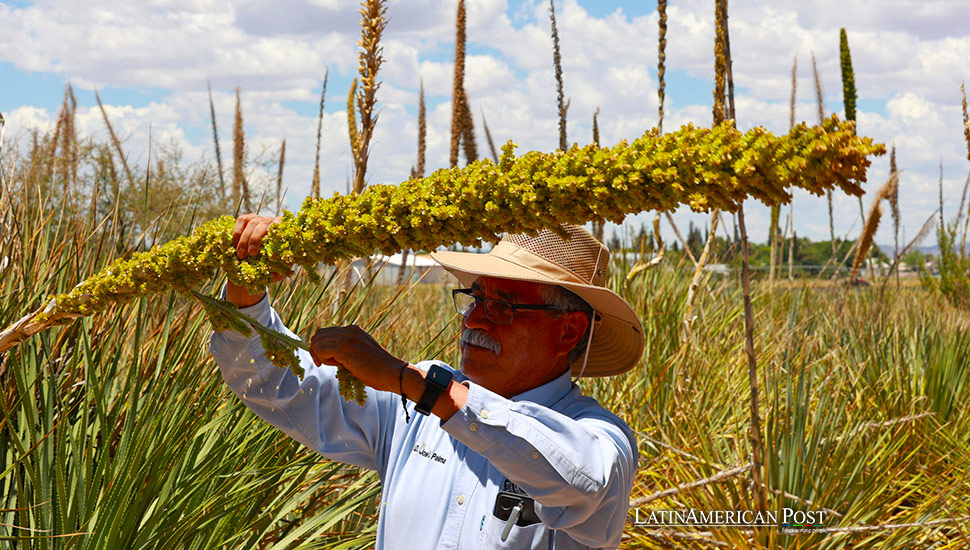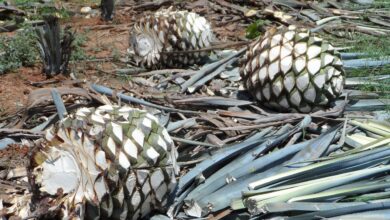Sotol Surpasses Tequila as the New Mexican Spirit Sensation

Under the harsh sun, jimadors harvest Sotol, a wild desert plant, to create Mexico’s latest favorite spirit. Celebrated by celebrities, this traditional drink from northern Mexico is gaining global recognition and commercial potential.
Under a scorching sun, the “jimador” wields an axe to cut the spiky leaves from a nearly 40-kilogram plant in the town of Delicias, in the northern state of Chihuahua. Sotol, the new favorite among fans of potent Mexican spirits, will be extracted from this plant. The jimador displays the piña, which will be cooked and distilled into Sotol. Accessing these plants is challenging, as they only grow wild on the steep slopes of Mexico’s extreme northern deserts, with blistering temperatures during the day and freezing conditions at night.
Despite these challenges, Sotol’s charm has reached the palates of celebrities like American actress Julia Roberts and musician Lenny Kravitz, both confessed fans of the liquor. One of the leading centers for sotol research is the Faculty of Agricultural and Forestry Sciences at the Autonomous University of Chihuahua (UACH). The first plant was domesticated in the late 1980s in this pioneering institution. “We rescued sotol from the brink of extinction at the end of the last century and opened the door to its commercialization,” explained Dr. José Inés Palma Escamilla, a professor at the faculty.
Preserving the Sotol Tradition
Sotol, or zotol, derives from the Nahuatl word ‘tzotollin,’ meaning ‘sweet from the head.’ It is a traditional alcoholic beverage from northern Mexico, distinguished by its unique production process that has been preserved for over 800 years by the region’s indigenous communities. Sotol, with its strong alcohol content ranging between 38 and 45 percent, and its smoky and vanilla aromas, stands out among other spirits.
From a commercial standpoint, entrepreneurs in Chihuahua believe Sotol has significant growth potential, though they emphasize the need for increased investment in technology. Alfonso Lechuga, leader of the Agroindustry and Advanced Food Cluster of Chihuahua, highlighted that Sotol could follow in the footsteps of other successful beverages like tequila or mezcal if science and business join forces. “We have tequila, which has decades of international recognition. Mezcal, I would say, took off about 20 years ago. Sotol is moving more slowly, but it’s already here,” Lechuga told EFE.
For Lechuga, one of the obstacles to Sotol’s growth is the limited number of commercial plantations, which makes it very costly and leads to significant diversity among producers. Nonetheless, he emphasized that steps are being taken in the right direction with the creation of a regulatory council for the denomination of origin in the three states where it is cultivated: Durango, Coahuila, and Chihuahua, the latter of which accounts for 75% of total production.
Commercializing Sotol
Sotol’s journey from a traditional indigenous drink to a globally recognized spirit reflects the broader narrative of many Latin American products gaining international acclaim. Making Sotol involves meticulous harvesting and distillation techniques that have been passed down through generations. The plant, known scientifically as Dasylirion takes around 15 years to mature in the wild. With their deep knowledge of the plant and its growth patterns, the jimadors play a crucial role in maintaining the tradition and quality of sotol production.
Commercial interest in Sotol has grown as entrepreneurs recognize its potential to follow the successful paths of tequila and mezcal. However, the market for Sotol remains nascent, with challenges in standardizing production and scaling up plantations. This is where investment in technology and research becomes critical. By improving cultivation techniques and refining the distillation process, producers can increase yields and maintain consistency in quality, making Sotol more competitive in the global market.
Establishing a regulatory council for the denomination of origin is a significant step toward protecting and promoting Sotol. This council will ensure that Sotol produced in Durango, Coahuila, and Chihuahua meets specific standards, preserving its authenticity and heritage. It will also help market sotol internationally, providing consumers with a guarantee of quality and origin similar to tequila and mezcal.
Sotol’s Global Appeal
Sotol’s rise in popularity among international celebrities and connoisseurs not only highlights its potential to become a global sensation but also instills a sense of optimism. Its unique flavors, with its smoky and vanilla notes, offer a distinct alternative to other spirits. As consumers around the world seek authentic and artisanal products, Sotol’s rich heritage and unique production process position it well to capture a niche market.
The increasing demand for Sotol has led to many producers exploring innovative ways to market the spirit. The sotol industry is evolving rapidly, from craft distilleries focusing on small-batch production to large-scale operations aiming to expand distribution. Events and festivals celebrating Mexican spirits also help to introduce Sotol to new audiences, allowing consumers to taste and learn about the spirit firsthand.
Sotol’s potential extends beyond its status as a drink. It symbolizes the resilience and ingenuity of the communities that have preserved their production methods for centuries. By supporting the sotol industry, we can promote sustainable development in northern Mexico, create jobs, and protect cultural heritage.
As the sun beats down on the arid landscapes of northern Mexico, the jimadors continue their labor-intensive work, harvesting the wild sotol plants that give rise to one of Mexico’s most intriguing spirits. Sotol’s journey from the desert slopes of Chihuahua to the glasses of international celebrities and spirit enthusiasts is a testament to its unique appeal and the dedication of those who produce it.
The challenges of commercialization and the need for technological investment are significant, but the steps toward standardization and international marketing are promising. With its deep cultural roots and distinctive flavor profile, Sotol has the potential to follow in the footsteps of tequila and mezcal, becoming a symbol of Mexican craftsmanship and tradition on the global stage.
Also read: Mexico and U.S. Enhance Security for Avocado and Mango Inspectors
As Sotol gains recognition and continues to captivate the palates of drinkers worldwide, it stands as a reminder of Latin America’s rich heritage and innovative spirit. The future of Sotol is bright, and its story is just beginning.





